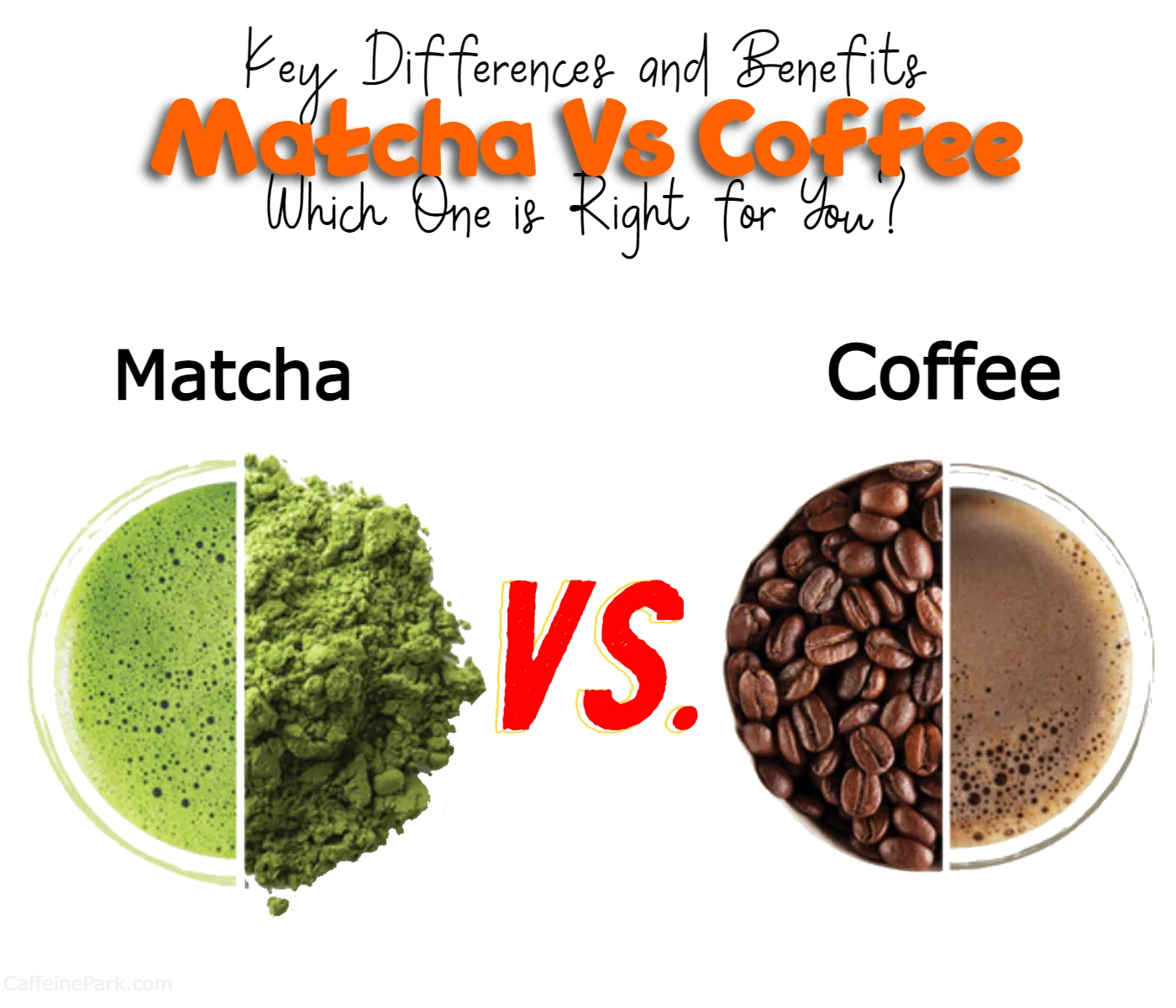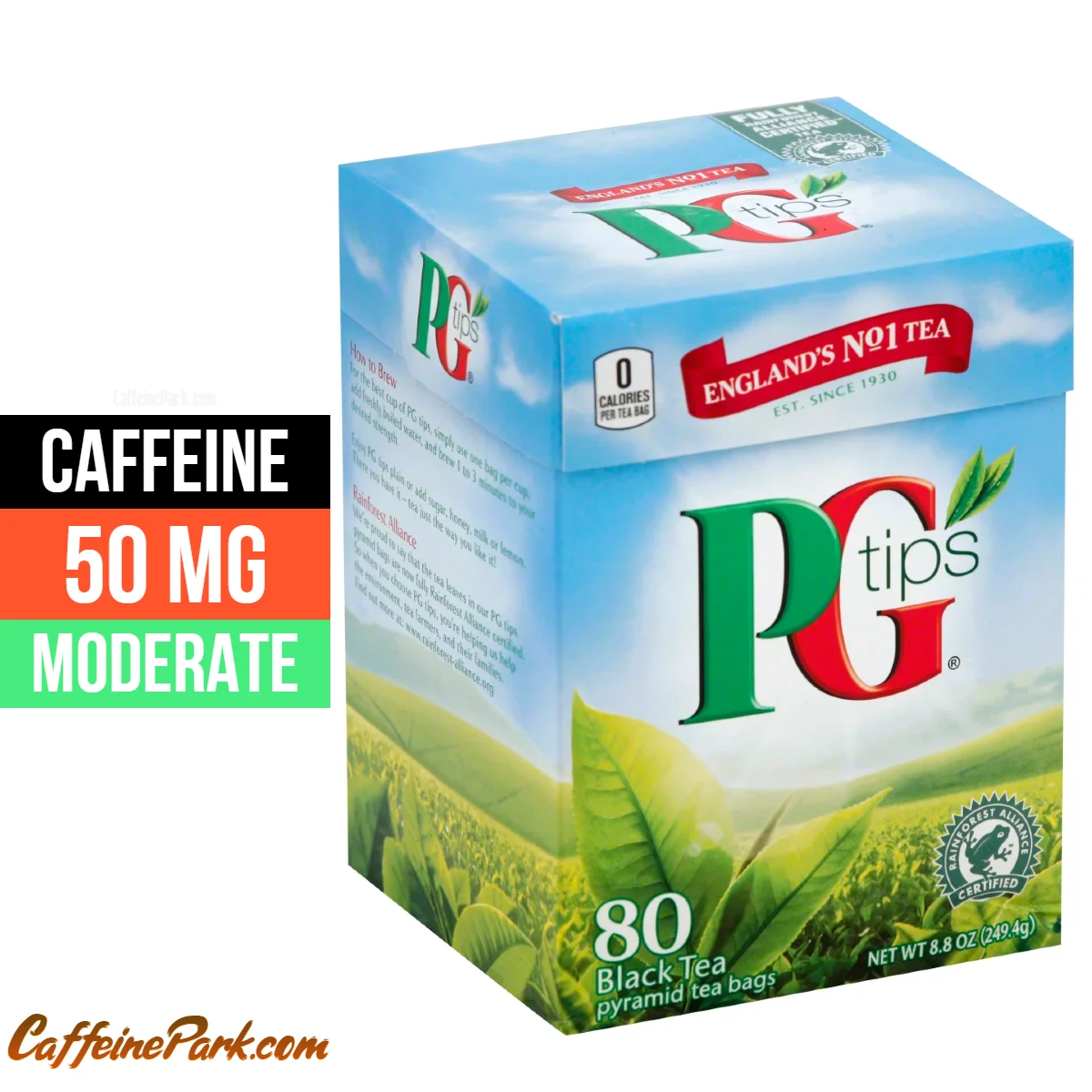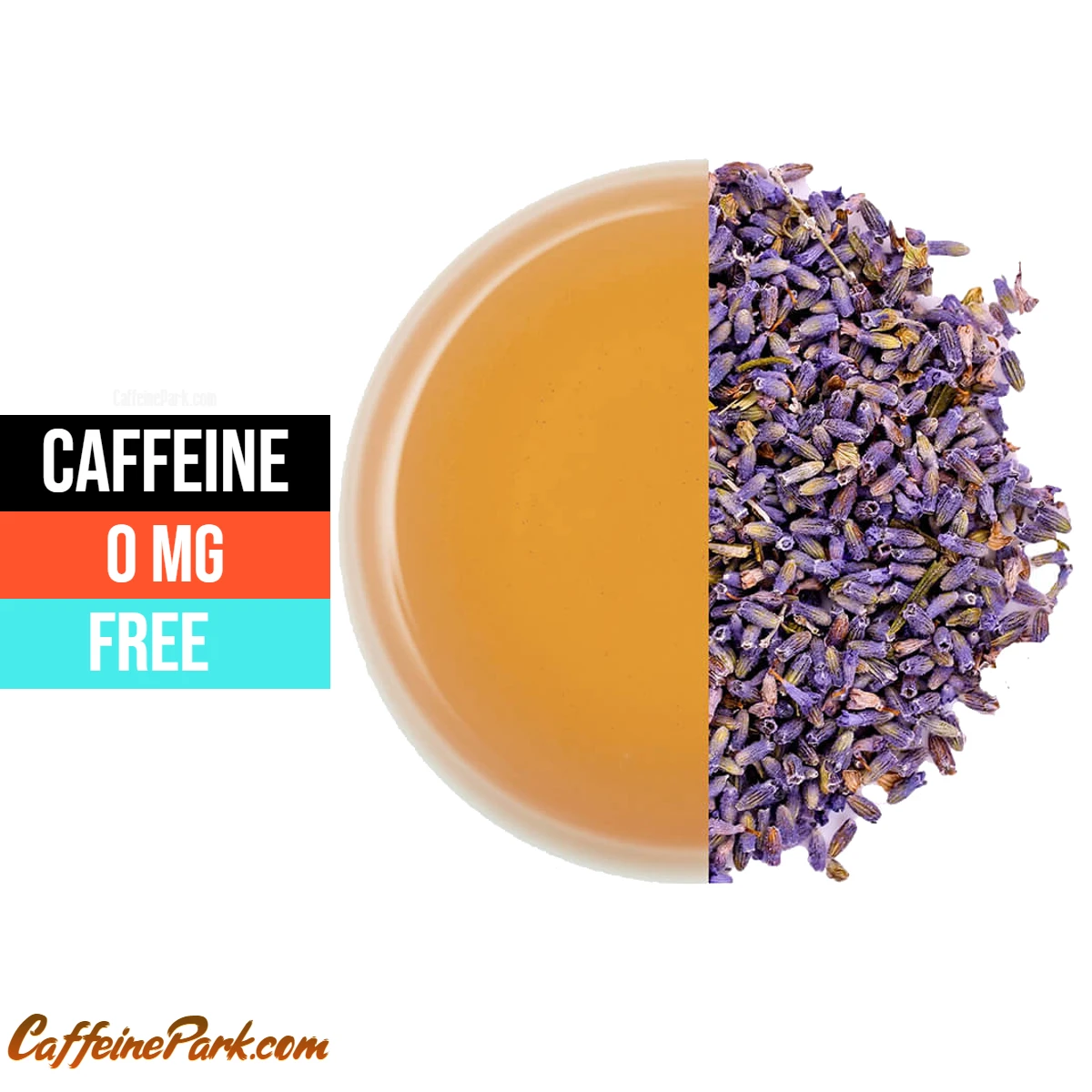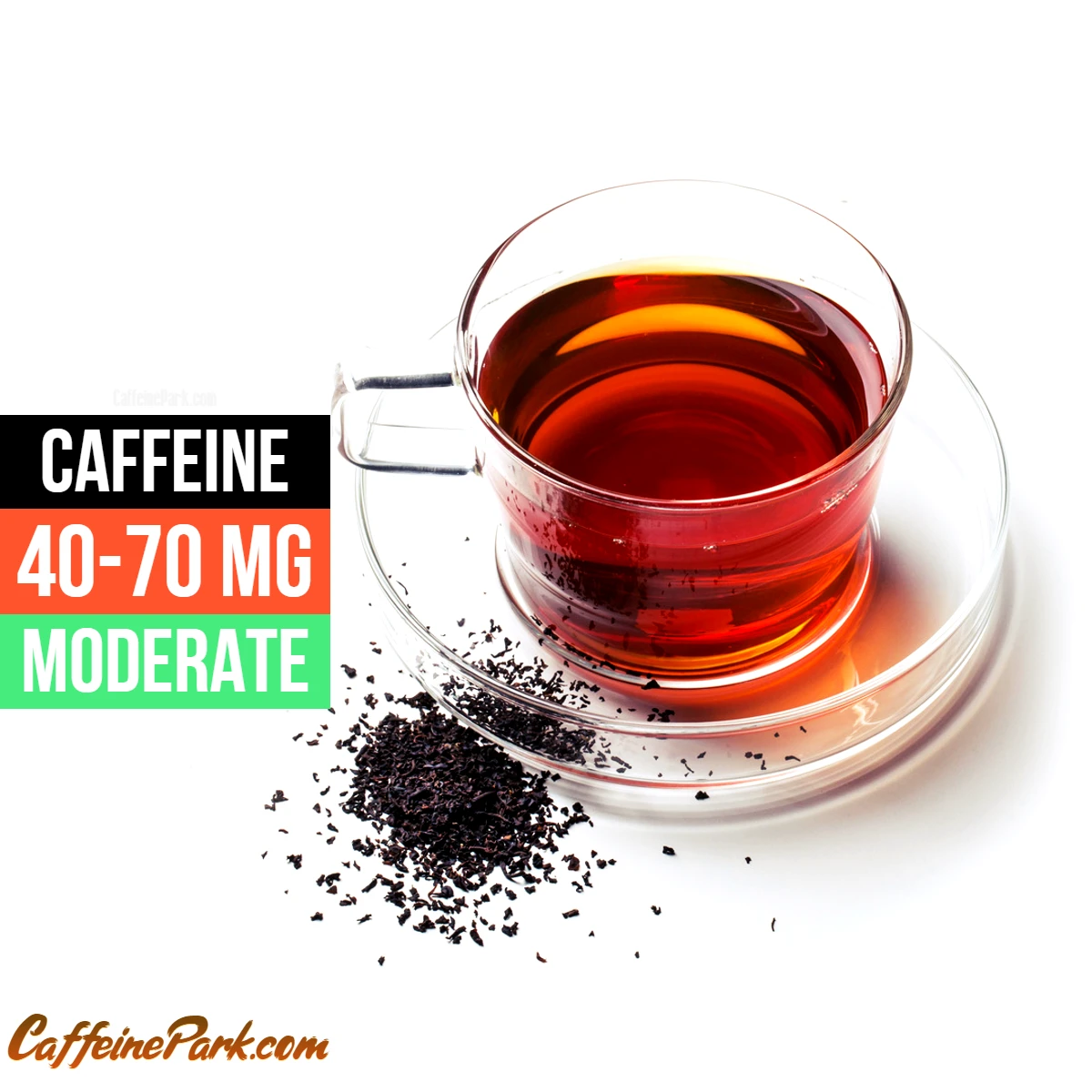
English breakfast tea is a popular black tea blend that originated in the United Kingdom and is enjoyed around the world. The blend typically consists of a combination of Assam, Ceylon, and Kenyan teas, although the specific combination and proportions of teas may vary depending on the brand. Well, you’re in luck! In this blog post, we’ll explore the caffeine content of English breakfast tea and provide you with all the information you need to know. So grab your teacup and let’s dive in!
When it comes to caffeine, a standard 8-fluid-ounce cup of English breakfast tea typically contains around 40mg to 70mg. However, keep in mind that this range can vary depending on factors such as brewing time, tea leaf quality, and personal preferences. If you prefer metric measurements, a 100ml serving of English breakfast tea usually contains approximately 15 to 30 milligrams of caffeine.
Are you curious to learn more about the fascinating world of tea and its caffeine content? We’ve got you covered! In the rest of this blog post, we’ll delve deeper into the factors that can influence the caffeine levels in English breakfast tea, compare it to other types of tea, and answer some frequently asked questions. So whether you’re a tea aficionado or simply enjoy a comforting cuppa, this blog post will satisfy your curiosity about the caffeine content in English breakfast tea.
Does English breakfast tea have caffeine?
Yes, A standard English breakfast contains about 40mg to 70mg of caffeine per 8 fl oz cup. This means 100 ml of this tea contains 15 to 30 milligrams of caffeine.
| Serving size | Caffeine Amount | Caffeine strength |
|---|---|---|
| 100 ml | 15mg to 30mg | LOW |
| 8 fl oz cup (236 ml) | 40mg to 70mg | MODERATE |
- Caffeine Amount: 40mg to 70mg
- Caffeine strength: MODERATE
- Calories: 0
- Serving size: 8 fl oz cup
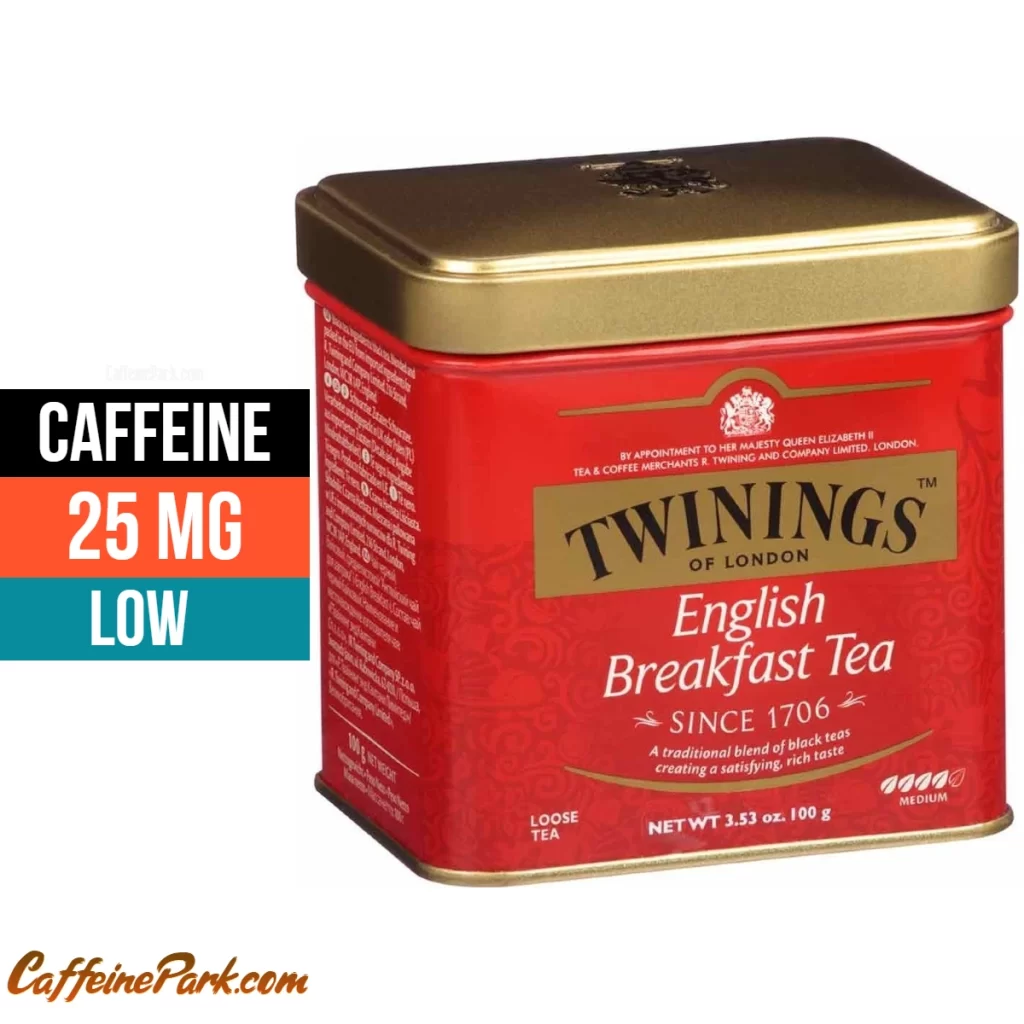
How Much Caffeine is in Twinings English Breakfast?
| Steep Time | Caffeine Amount | Serving size |
|---|---|---|
| 1 Min Steep Time | 14 mg | 6oz cup |
| 3 Min Steep Time | 22 mg | 6oz cup |
| 5 Min Steep Time | 25 mg | 6oz cup |
Comparison of Caffeine in English Breakfast Tea vs other teas
English Breakfast tea is traditionally a blend of black teas known for their robust and full-bodied flavors. Let’s compare the caffeine content of English Breakfast tea with other popular tea varieties:
| HOT DRINKS | SERVING SIZE (FL OZ) | CAFFEINE (MG) |
|---|---|---|
| English Breakfast Tea | 8 fl oz | 40-70mg |
| Oolong tea | 8 fl oz | 37mg |
| Teas’ Tea Oolong | 16.9 fl oz | 70mg |
| Black tea | 8 fl oz | 42mg |
| Matcha tea | 8 fl oz | 64mg |
| Green tea | 8 fl oz | 25-50mg |
| Yellow Tea | 8 fl oz | 64mg |
| Lipton Tea | 8 fl oz | 50mg |
| Chai Tea | 8 fl oz | 50mg |
English Breakfast tea typically contains a moderate to high level of caffeine, providing an energizing boost to start your day. When compared to other tea varieties, such as green tea, oolong tea, and white tea, English Breakfast tea generally has a higher caffeine content. However, it’s important to consider individual factors, brewing methods, and specific tea blends, as they can all influence caffeine levels.
If you’re sensitive to caffeine or prefer a lower caffeine intake, exploring decaffeinated tea options or opting for herbal teas can provide a delightful and caffeine-free experience.
Factors considering the caffeine content in English breakfast tea
Several factors come into play when considering the caffeine content in English breakfast tea. Understanding these factors can help you better appreciate and control the caffeine levels in your cup of tea. Here are a few key factors to consider:
- Tea Leaves Quality: The quality of the tea leaves used in English breakfast tea can impact the caffeine content. Different varieties and grades of tea leaves may have varying caffeine concentrations. Higher-quality tea leaves, such as whole leaves or tips, are generally associated with a richer flavor and potentially higher caffeine content.
- Brewing Time: The length of time you steep your English breakfast tea can affect the caffeine levels. The longer the tea is steeped, the more time the caffeine has to be extracted from the leaves into the water. If you prefer a milder cup of tea with lower caffeine, you can reduce the brewing time to limit caffeine extraction.
- Water Temperature: The temperature at which you steep your tea can influence the caffeine content. Higher water temperatures tend to extract more caffeine from the tea leaves. If you want to reduce caffeine levels, consider using slightly cooler water and adjust your brewing time accordingly.
- Serving Size: The amount of tea you use per cup can also impact caffeine content. Using more tea leaves or tea bags can result in a higher caffeine concentration. Be mindful of the recommended serving size and adjust accordingly to control your caffeine intake.
Side Effects of English breakfast tea
Before we delve into the potential side effects, let’s first understand what exactly English Breakfast tea is. Traditionally, it’s a blend of various black teas, such as Assam, Ceylon, and Kenyan teas. The robust flavor profile and rich amber color make it a popular choice for breakfast or any time of the day when you need a little pick-me-up.
The Benefits of English Breakfast Tea
Like all teas, English breakfast tea is a good source of antioxidants, which can help to protect your body from the damaging effects of free radicals. The tea also contains small amounts of caffeine, which can help to boost energy and alertness. However, it is important to note that the caffeine content of tea can vary depending on the brand and preparation method, so it is a good idea to check the label or packaging if you are sensitive to caffeine or trying to limit your intake.
In addition to its antioxidant and caffeine content, English breakfast tea has been linked to a number of potential health benefits. Some studies have suggested that tea may help to improve heart health, reduce the risk of stroke, and even lower the risk of certain types of cancer. However, more research is needed to confirm these potential health benefits and to determine the optimal dosage and frequency of tea consumption. English Breakfast tea offers a range of potential benefits, thanks to its black tea base. Here are some reasons why people enjoy this delightful brew:
- Boost of Energy: The caffeine content in black tea can provide a gentle energy boost, making it an ideal choice to kickstart your day or combat mid-afternoon sluggishness.
- Antioxidant Power: Black tea contains antioxidants called polyphenols, which may help reduce the risk of chronic diseases and support overall health.
- Heart Health: Some studies suggest that regular black tea consumption may contribute to a healthier heart by improving blood pressure and reducing the risk of heart disease.
- Digestive Aid: The tannins present in black tea can help soothe the digestive system, potentially easing discomfort and promoting healthy digestion.
Potential Side Effects of English Breakfast Tea
While English Breakfast tea can be a delightful addition to your daily routine, it’s essential to be aware of potential side effects. Here are some factors to consider:
- Caffeine Sensitivity: As English Breakfast tea contains caffeine, individuals who are sensitive to this stimulant may experience side effects such as jitters, restlessness, increased heart rate, or difficulty sleeping. If you’re particularly sensitive to caffeine, you might want to limit your intake or opt for decaffeinated versions of English Breakfast tea.
- Stained Teeth: Like many other dark-colored beverages, regular consumption of English Breakfast tea may contribute to tooth discoloration over time. Good oral hygiene practices, such as brushing regularly and visiting your dentist, can help minimize this effect.
- Potential Dehydration: Although tea contains water, it also possesses diuretic properties, which means it may increase urine production and potentially contribute to mild dehydration. To stay properly hydrated, make sure to balance your tea intake with an adequate amount of water throughout the day.
- Interference with Iron Absorption: Black tea contains compounds known as tannins, which can inhibit the absorption of iron from plant-based sources. If you rely on plant-based iron sources or have an iron deficiency, consider spacing out your tea consumption from meals to minimize any interference.
Brewing the Perfect Cup
Brewing English Breakfast tea to perfection is an art in itself. Here’s a step-by-step guide to help you create a delightful cup every time:
- Start with Fresh Water: Begin by using fresh, cold water. Avoid reusing water that has been boiled before, as it may affect the taste.
- Boiling Water: Bring the water to a rolling boil. English Breakfast tea requires hot water to extract its full flavor.
- Preheat Your Teapot or Mug: To maintain the optimal temperature of your tea, preheat your teapot or mug by rinsing it with hot water and then discarding the water.
- Tea to Water Ratio: Use approximately one teaspoon of loose leaf tea or one tea bag per 8-ounce cup of water. Adjust the amount according to your taste preferences.
- Steeping Time: Steep the tea for about 3-5 minutes. This duration allows the flavors to fully develop without becoming too strong or bitter. Adjust the steeping time based on your personal preference.
- Remove Tea Leaves or Tea Bag: Once the desired steeping time has passed, remove the tea leaves or tea bag from the water to prevent over-extraction.
- Enjoy as Is or with Accompaniments: English Breakfast tea is typically enjoyed plain or with a dash of milk and a sweetener of your choice. Experiment with different accompaniments to find your perfect cup.
Pairing English Breakfast Tea with Food
English Breakfast tea pairs wonderfully with a variety of foods. Here are some classic and creative food pairings that can enhance your tea-drinking experience:
- Traditional Breakfast Fare: Start your day off right by pairing English Breakfast tea with classic breakfast items such as eggs, bacon, sausage, toast, or pastries. The robust flavor of the tea complements the savory or sweet components of a traditional breakfast spread.
- Scones and Pastries: Indulge in the British tradition of enjoying tea with freshly baked scones, clotted cream, and strawberry jam. The slightly sweet and buttery flavors of scones beautifully complement the bold taste of English Breakfast tea.
- Cheese and Biscuits: Create a delightful afternoon tea experience by pairing English Breakfast tea with a selection of cheese and biscuits. The combination of rich, creamy cheese and crisp, savory biscuits balances well with the tea’s robust flavor.
- Spicy or Savory Dishes: English Breakfast tea can serve as a palate cleanser when enjoying spicy or savory dishes. Sip on a cup of tea between bites to refresh your taste buds and enhance the flavors of the food.
Review
English breakfast tea is a classic black tea blend that is enjoyed around the world for its bold, full-bodied flavor and strong, robust aroma. The blend is typically made with a combination of Assam, Ceylon, and Kenyan teas, which each contribute their own unique flavors to the blend. To prepare the tea, place the desired amount of loose-leaf tea or tea bags in a teapot or teacup and pour boiling water over it. Allow the tea to steep for 3-5 minutes, depending on your desired strength. English breakfast tea can be enjoyed on its own or with a splash of milk and a bit of sugar or honey to taste.
In addition to its delicious flavor, English breakfast tea has been linked to a number of potential health benefits. Tea is a good source of antioxidants and contains small amounts of caffeine, which can help to boost energy and alertness. Some studies have also suggested that the tea may have heart-protective and cancer-preventive effects, although more research is needed to confirm these potential benefits. Overall, English breakfast tea is a tasty and enjoyable beverage that can be enjoyed any time of day.
History
The exact origins of English breakfast tea are somewhat murky, but it is thought to have originated in the UK during the 19th century. It is believed that the blend was created as a way to make a strong, full-bodied tea that could be paired with a hearty breakfast. The name “English breakfast” likely refers to the fact that tea was often served at breakfast time in England, although it is now enjoyed at any time of day.
Taste
English breakfast tea has a bold, full-bodied flavor and strong, robust aroma. The blend is typically made with a combination of Assam, Ceylon, and Kenyan teas, which each contribute their own unique flavors to the blend. Assam teas are known for their malty, full-bodied flavor, while Ceylon teas are often described as having a more nuanced, complex flavor. Kenyan teas are known for their bright, lively flavors and are often used to add a bit of brightness to the blend.
Overall, English breakfast tea is a well-balanced blend that is both bold and smooth, with a rich, full-bodied flavor that is sure to satisfy. The flavor of the tea may vary depending on the specific blend and the proportion of each type of tea used, as well as the preparation method and the length of time that the tea is steeped. Some people may prefer a stronger, more robust flavor, while others may prefer a milder, smoother flavor.
Flavor and Aroma
English breakfast tea is known for its bold, full-bodied flavor and strong, robust aroma. The blend is typically made with a combination of Assam, Ceylon, and Kenyan teas, which each contribute their own unique flavors to the blend. Assam teas are known for their malty, full-bodied flavor, while Ceylon teas are often described as having a more nuanced, complex flavor. Kenyan teas are known for their bright, lively flavors and are often used to add a bit of brightness to the blend.
Overall, English breakfast tea is a well-balanced blend that is both bold and smooth, with a rich, full-bodied flavor that is sure to satisfy.
Variations
There are many variations of English breakfast tea available, with each brand offering its own unique blend of teas and flavors. Some blends may include a higher proportion of Assam tea for a bolder, malty flavor, while others may include more Ceylon tea for a more nuanced, complex flavor. Some blends may also include other types of tea, such as Darjeeling or Nilgiri, to add additional depth and complexity to the flavor.
In addition to traditional English breakfast tea blends, there are also flavored versions of the tea available. These blends may include additional ingredients, such as fruits, herbs, or spices, to add a twist to the classic flavor. For example, you may find English breakfast teas flavored with ingredients such as strawberry, raspberry, or even chocolate.
Preparation
English breakfast tea is typically prepared using loose-leaf tea, although it is also available in tea bags. To prepare the tea, place the desired amount of loose-leaf tea or tea bags in a teapot or teacup. Bring fresh, cold water to a boil and pour it over the tea leaves or tea bags. Allow the tea to steep for 3-5 minutes, depending on your desired strength.
If you prefer a stronger cup of tea, you can use more tea leaves or steep the tea for a longer period of time. If you prefer a weaker cup of tea, use fewer tea leaves or steep the tea for a shorter period of time. You can also adjust the strength of the tea by using more or less water.
Serving
English breakfast tea is typically served hot and can be enjoyed on its own or with a splash of milk and a bit of sugar or honey to taste. Some people also like to add a slice of lemon to their tea for a bit of added citrus flavor. The tea can be served in a teapot or individual teacups, depending on your preference.
Regional Differences in English Breakfast Tea
English breakfast tea is enjoyed around the world, and there may be some regional differences in the way that the tea is prepared and served. In the UK, for example, it is common to add milk to the tea, while in other parts of the world, the tea may be served without milk. Some people in the UK also prefer to add sugar or honey to their tea, while others prefer to drink it plain.
There may also be regional differences in the specific teas that are used in English breakfast blends. In the UK, for example, it is common for the blend to include a higher proportion of Assam tea, while in other parts of the world, the blend may be made with a greater proportion of Kenyan or Ceylon teas.
Choosing the Best
When choosing an English breakfast tea, there are a few factors to consider. First, consider the specific teas that are included in the blend and how they may affect the flavor. If you prefer a bolder, malty flavor, look for a blend that includes a higher proportion of Assam tea. If you prefer a more nuanced, complex flavor, look for a blend that includes a higher proportion of Ceylon or Darjeeling tea.
It is also a good idea to consider the source of the tea leaves and whether they are sustainably grown and ethically sourced. This can ensure that you are getting a high-quality product that has been produced in an environmentally and socially responsible manner. Choosing a quality blend can make a significant difference in taste and overall experience. Here are a few pointers to help you select the best tea:
- Loose Leaf or Bagged: Both loose-leaf and bagged teas can offer a delightful cup of English Breakfast tea. Loose-leaf tea generally provides a more robust and fresher flavor, while tea bags offer convenience. Consider your preferences and choose accordingly.
- Check the Ingredients: Read the label and check the ingredients list to ensure you’re getting a genuine English Breakfast tea blend. Look for high-quality black teas, such as Assam, Ceylon, or Kenyan, as these are the traditional components of this blend.
- Consider Organic and Fair Trade Options: If you prefer to support organic farming practices or fair trade principles, look for teas that carry these certifications. Organic teas are free from synthetic pesticides, while fair trade teas ensure that farmers receive fair wages and work under safe conditions.
FAQs
A standard 8 fluid ounce cup of English breakfast tea usually contains around 40mg to 70mg of caffeine.
The caffeine content can vary slightly between different brands and even within the same brand due to factors such as tea leaf quality and brewing methods. However, the range of 40mg to 70mg per cup is generally applicable.
English breakfast tea falls within the range of moderate caffeine content when compared to other types of tea. It typically contains more caffeine than green tea but less caffeine than coffee or black teas with higher caffeine concentrations.
Yes, you can reduce the caffeine content in English breakfast tea by opting for decaffeinated versions available in the market. Decaffeinated English breakfast tea goes through a process to remove most of the caffeine while retaining the flavor.
Yes, several factors can affect the caffeine content, including brewing time, water temperature, tea leaf quality, and steeping method. Longer steeping times and higher water temperatures tend to extract more caffeine from the tea leaves.
While English breakfast tea has moderate caffeine content, individuals who are particularly sensitive to caffeine may still experience its stimulating effects. It is advisable for such individuals to monitor their intake and consider alternatives like herbal teas that are naturally caffeine-free.
Is English breakfast tea high in caffeine?
Compared to some other caffeinated beverages, such as coffee or energy drinks, English breakfast tea has relatively moderate caffeine content. However, the caffeine content of English breakfast tea can vary depending on the specific blend and the preparation method, so it is a good idea to check the label or packaging if you are sensitive to caffeine or trying to limit your intake. If you are concerned about your caffeine intake, it is a good idea to choose a brand of English breakfast tea that has a lower caffeine content or to brew the tea for a shorter period of time to reduce the caffeine content.
Can I consume English breakfast tea if I am sensitive to caffeine?
If you are sensitive to caffeine or have a medical condition that requires you to limit your caffeine intake, it is a good idea to choose a brand of English breakfast tea that has a lower caffeine content or to brew the tea for a shorter period of time to reduce the caffeine content. It is also a good idea to speak with your healthcare provider to determine the appropriate caffeine intake for your individual needs.
Can I consume English breakfast tea if I am pregnant?
It is generally recommended that pregnant women limit their caffeine intake to 200 milligrams per day or less. One 8-ounce (240-milliliter) serving of English breakfast tea typically contains around 40-70 milligrams of caffeine, although this can vary depending on the specific blend and the preparation method. If you are pregnant and concerned about your caffeine intake, it is a good idea to choose a brand of English breakfast tea that has a lower caffeine content or to brew the tea for a shorter period of time to reduce the caffeine content. It is also a good idea to speak with your healthcare provider to determine the appropriate caffeine intake for you during pregnancy.
is English breakfast tea keto?
Keto-Friendly tea is not just about caffeine. Keto-Friendly teas are often naturally low in calories and contain natural flavors and aromas. Some may even contain zero carbs, while others may contain a few grams per cup. However, if you are looking for a true keto-friendly tea, Twinings English Breakfast Black Tea should be your first choice.
Its flavor is mild, yet bold. The tea contains no added sugars, which means there is no risk of a “sugar crash” when drinking it. There is also no trace of artificial sweeteners, making it safe for all those with diabetes. When you combine this with its high levels of antioxidants and other beneficial compounds, you get a very healthy drink.
Is English breakfast tea good for you?
Like all teas, English breakfast tea is a good source of antioxidants, which can help to protect your body from the damaging effects of free radicals. The tea also contains small amounts of caffeine, which can help to boost energy and alertness. However, it is important to note that the caffeine content of tea can vary depending on the brand and preparation method, so it is a good idea to check the label or packaging if you are sensitive to caffeine or trying to limit your intake.
In addition to its antioxidant and caffeine content, English breakfast tea has been linked to a number of potential health benefits. Some studies have suggested that tea may help to improve heart health, reduce the risk of stroke, and even lower the risk of certain types of cancer. However, more research is needed to confirm these potential health benefits and to determine the optimal dosage and frequency of tea consumption.
It is worth noting that while English breakfast tea can be a healthy beverage choice, it is important to consume it in moderation as part of a well-balanced diet. It is also a good idea to be mindful of the other ingredients that you add to your tea, such as milk, sugar, and honey, as these can add calories and affect the overall nutritional value of the beverage.
Is English breakfast tea the same as regular black tea?
English breakfast tea is a specific blend of black teas that originated in the UK. It is made with a combination of Assam, Ceylon, and Kenyan teas and is known for its bold, full-bodied flavor. While all English breakfast teas are black teas, not all black teas are English breakfast teas.
Black tea is a type of tea that is fully fermented, which gives it its dark color and robust flavor. Black teas are typically stronger and more astringent than other types of tea, such as green tea or oolong tea. English breakfast tea is a blend of black teas that is specifically designed to be paired with a hearty breakfast and is known for its bold, full-bodied flavor.
Other types of black tea include Darjeeling, Assam, and Ceylon tea, each of which has its own unique flavor profile. Black tea can be enjoyed on its own or with a splash of milk and a bit of sugar or honey to taste. It can also be used as a base for iced tea or blended with other ingredients to create flavored teas.
Is English breakfast tea caffeinated?
Yes, English breakfast tea does contain caffeine. The caffeine content of tea can vary depending on the specific blend, the preparation method, and the length of time that the tea is steeped. In general, black teas such as English breakfast tea have a higher caffeine content than green teas or herbal teas.
Can I add milk to English breakfast tea?
Yes, it is common to add milk to English breakfast tea, especially in the UK. Some people prefer to add a splash of milk to their tea to balance out the bold flavor, while others prefer to drink their tea plain. If you prefer to add milk to your tea, be sure to add it after the tea has been brewed, as adding milk to the hot water before brewing the tea can affect the flavor of the tea.
Can I drink English breakfast tea on an empty stomach?
There is no definitive answer to this question, as it depends on your personal tolerance and sensitivity to caffeine. Some people may find that drinking tea on an empty stomach can cause digestive discomfort or irritation, while others may have no issues. If you are sensitive to caffeine or have digestive issues, you may want to avoid drinking tea on an empty stomach. If you do decide to drink tea on an empty stomach, it is a good idea to start with a small amount and see how your body reacts.
Is English breakfast tea good for weight loss?
There is no evidence to suggest that English breakfast tea alone can help with weight loss. However, replacing sugary drinks with tea, including English breakfast tea, can be a healthy choice as it can help to reduce your overall caloric intake. Additionally, the caffeine in tea may have a mild appetite-suppressing effect and may help to increase energy levels and boost metabolism. However, it is important to note that weight loss is the result of a caloric deficit, so it is important to focus on a healthy diet and regular exercise in addition to making healthy beverage choices.
Is it OK to drink English breakfast tea every day?
There is no definitive answer to this question, as it depends on your individual tolerance and sensitivity to caffeine, as well as any medical conditions or medications you may be taking. In general, moderate tea consumption is considered safe for most people and may have some potential health benefits. However, it is important to be mindful of your caffeine intake, as consuming large amounts of caffeine can have negative effects on your health.
The U.S. Food and Drug Administration (FDA) considers 400 milligrams of caffeine per day to be a safe amount for most adults. This is equivalent to about 4-5 cups of English breakfast tea, depending on the specific blend and the preparation method. However, it is worth noting that the caffeine content of tea can vary widely, so it is a good idea to check the label or packaging if you are sensitive to caffeine or trying to limit your intake.
If you are concerned about your caffeine intake or have a medical condition that requires you to limit your caffeine intake, it is a good idea to speak with your healthcare provider to determine the appropriate amount of caffeine for you. They can take into account your individual needs and any medications you may be taking.
Read More:
Contents
- Does English breakfast tea have caffeine?
- How Much Caffeine is in Twinings English Breakfast?
- Comparison of Caffeine in English Breakfast Tea vs other teas
- Factors considering the caffeine content in English breakfast tea
- Side Effects of English breakfast tea
- Review
- FAQs
- Is English breakfast tea high in caffeine?
- Can I consume English breakfast tea if I am sensitive to caffeine?
- Can I consume English breakfast tea if I am pregnant?
- is English breakfast tea keto?
- Is English breakfast tea good for you?
- Is English breakfast tea the same as regular black tea?
- Is English breakfast tea caffeinated?
- Can I add milk to English breakfast tea?
- Can I drink English breakfast tea on an empty stomach?
- Is English breakfast tea good for weight loss?
- Is it OK to drink English breakfast tea every day?
